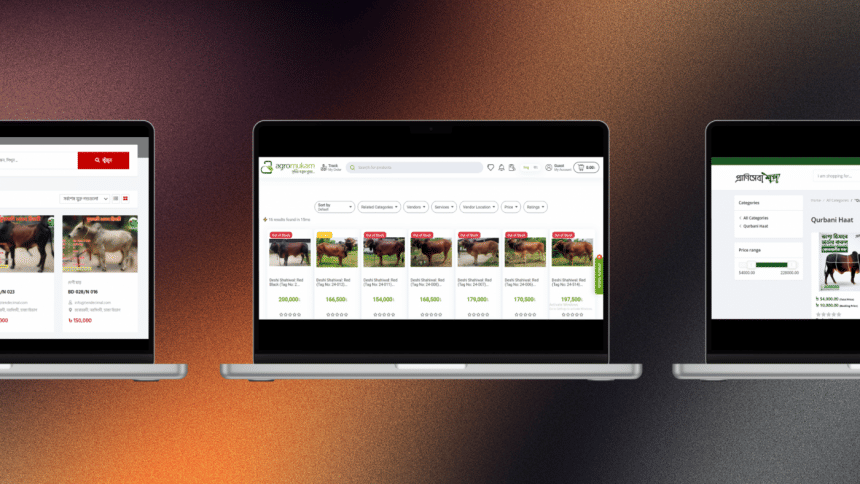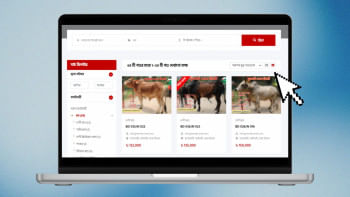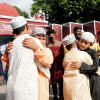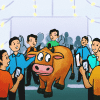Online cattle ‘haats’ rising in popularity

As Bangladesh continues to embrace digital transformation across various sectors, the concept of the 'digital haat' for sacrificial animals is emerging as a noteworthy development. However, the journey towards full digital adoption in this arena appears to be swarming with challenges and opportunities.
The biggest initiative so far in the case of digital haat began with digitalhaat.gov.bd, an effort by e-Cab, ekShop, Dhaka North City Corporation (DNCC), Bangladesh Dairy Farmers' Association, and other government agencies. According to a report from 2023 on their website, digitalhaat.gov.bd sold 56,821 animals from 20 to 28 June last year, with a sale volume of BDT 422 crore 23 lakh 59 thousand 257.
Jahangir Alam Shovon, Executive Director of e-Cab, shared his insights on the evolving landscape. "The buyers are enthusiastic, but we have seen a lack of interest among the sellers when it comes to online haat, as the price of sacrificial animals fluctuates in the traditional market based on supply and demand," he explained. The Covid-19 pandemic saw a significant surge in online sales, but this trend has been declining. "This year, our projection is that the sale volume will be half of what happened in 2023," he added.
Jahangir emphasised the need for greater collaboration to boost the popularity of online haats. "More initiatives must be taken by related stakeholders. Our platform is charge-free for both buyers and sellers. We also have guidelines for selling animals online, and if any buyer complains about their purchase, we look into the matter," he said.
While this initiative is struggling, there are other local initiatives behind digital haat. Some of them are bringing new concepts to the arena of online haats.
Adorsho praniSheba is running its digital market for sacrificial animals for the fourth consecutive year through their 'praniSheba Shop'. Fida Hoque, CEO and MD of Adorsho praniSheba said, "We have set a fixed price for our sacrificial cattles. Last year, we sold 109 cattles online and 209 cattles offline from our available 320 cattles to various customers. The online sale volume alone was BDT 1.06 crore. We provide customers with videos of the cattles and price the meat according to live weight of the cattle."
"This year, we have observed a rise in 'Bhaag' (shared Qurbani), allowing people to purchase meat portions according to their budget, which we then home deliver. This method reduces pollution, as the animals are not transported live, and we can process the meat and blood in our facilities," he adds.
Highlighting the unique aspects of praniSheba, Fida said, "Our company integrates InsurTech and FinTech solutions. We utilise unique identification technology by saving the muzzle patterns of cows, similar to fingerprint technology. This ensures each cow has a unique identifier, allowing for insurance coverage and making banks more confident in providing low-interest loans to farmers. Additionally, we offer crowdfunding projects through praniSheba JouthoKhamar for farmers lacking sufficient funds."
There are also some agro and individual initiatives who sell using social media platform Facebook along with in-person sales. Some of them are observing growth steadily.
Masrur Ahmed, MD of SAC Agro, shared his company's growth story. "In 2023, we sold 23 cattle online, all priced at less than BDT 2 lakhs. This year, we have already sold 34 cattle online so far. We take full liability for the animal before delivery to maintain customer satisfaction," Ahmed stated.
Ibrahim Shapan, AGM & Head of Othoba.com, discussed their success in the digital marketplace. "We sold around 70 cattle last year with a sale volume of around BDT 1.2 crore. This year, we have already sold around 150 cattle with a sale volume of BDT 2.5 crore. Due to inflation, this year the most popular cattles are from the price range of BDT 1 lakh 30 thousand to BDT 1 lakh 50 thousand. Most of our customers are from either Dhaka or Chattogram," Shapan noted.
Despite these successes, challenges remain. As digital haats still rely on photos and videos, it is difficult for many buyers to understand the specifics of the sacrificial animals. There is also the issue of trust among buyers and sellers when it comes to online transactions.
"The online market for cattles is not yet fully reliable to customers and local farmers, there is a lot of work that needs to be done," mentioned Touhidul Alam Zenith, MD of Sadeeq Agro and Chairman of Agromukam, an online selling platform. He added that rural farmers have not yet adapted to the online platforms so it is important to make them interested.
"From Agromukam, we are trying to help the rural farmers. We send them portable weight machines and tell them to send pictures and we do the rest. We have set BDT 500 for per kg live weight which is an important guideline to set steady price tags for both the customers and the farmers. Also it is hard to maintain customer satisfaction without a physical establishment," Touhidul added.
'Digital haats' are becoming more common with each year, with their growing advantages such as online payment, home delivery, waste management and so on. But more remains to be done in terms of mass popularity and acceptance. The enthusiasm among buyers is evident, but achieving widespread adoption among sellers and rural farmers will require continued effort, innovation, and collaboration.

 For all latest news, follow The Daily Star's Google News channel.
For all latest news, follow The Daily Star's Google News channel. 








Comments